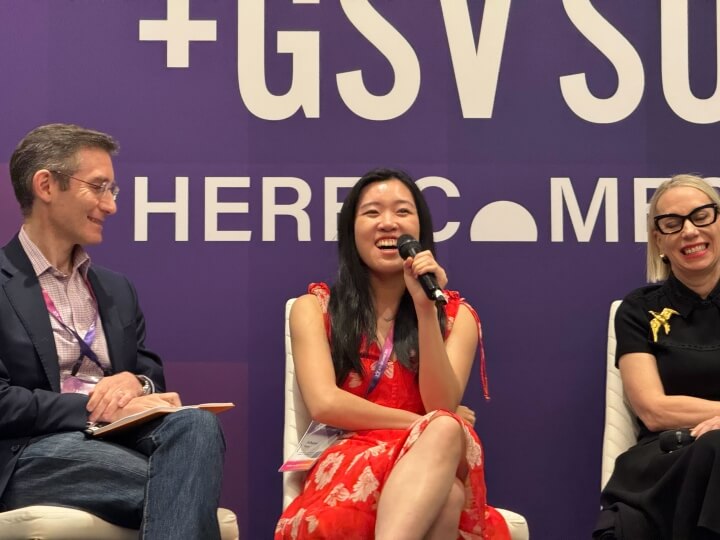Athena Kan, A.B. '19
Athena Kan, A.B. '19, never considered a career in tech before taking “CS50: Introduction to Computer Science” at the Harvard John A. Paulson School of Engineering and Applied Sciences (SEAS). The course not only taught her to code – it opened her eyes to an entire industry.
“I had no idea the whole tech world was out there, that people started their own companies while they were still in college, or right after college,” Kan said. “That wasn’t in my frame of reference of what people could do, and the course really expanded my range of what was possible.”
By her second year, Kan began to think about ways to use her computer science education to not only start a company, but to start one that could make a positive impact in people’s lives. Her first company was “Coding It Forward,” a non-profit that aimed to bring more young, technology-savvy people into government work. The organization started with a technology fellowship at the U.S. Census Bureau, and has since expanded to a dozen federal agencies.
“Coding It Forward began because we saw that many government systems were broken and hard to access, and we wanted to bring technical talent to the federal government,” she said. “It’s since grown so much. I’m not really involved anymore, but they’ve even scaled to state and local governments, which is so cool, all in the effort of making government more effective.”
Wanting to build a company that could scale faster than most non-profits allow, Kan paired up with former CS50 classmate Brandon Wang and Harvard Graduate School of Education graduate Shiroy Aspandiar to co-found and become CEO for Dreambound, an online platform that helps people start new careers by connecting them with degree and certificate programs that offer the necessary training. Founded after she graduated, Dreambound now gets hundreds of thousands of people looking for education each month, who are then connected with over 300 partner schools and universities.
“People who are looking to change careers use Dreambound to search for the right education that will help them get there,” she said. “We serve everyone, but the majority are adults who feel a little bit lost in their lives and are trying to figure out what to do next. We help them find everything from short certificate programs to a full four-year degree.”
Kan, who grew up in Maryland, used her time at Harvard to explore both the technology and venture worlds. She interned as a software engineer at Uber, and was a managing partner at the Dorm Room Fund, a student-run venture capital firm. She took a semester off from Harvard to work on the investing team at 8VC, a venture capital firm based in Austin. After she graduated, she began working with her co-founders on Dreambound.
“I feel morally compelled to help people make better lives for themselves,” she said. “We explored a lot of different ideas, all in this space of helping people make more money to provide for themselves and their kids.”
Dreambound initially tried to match customers with companies that could pay for their certification in exchange for a work commitment. To get Dreambound off the ground, Kan called every training provider that she could until one agreed to partner up. Once several companies also agreed, Dreambound had its first career pipeline: It would pay for customers’ certified nursing assistant certification for a small registration fee, then provide job placement at a partner company, which the customer had to take. But, it quickly became clear that without large scale, it would be challenging to match customers to both a specific job and a training school with an easy commute.
“The first few years were very hard,” Kan said. “I’d never managed anyone before, and now I had to go manage a team of people. I feel very lucky that my co-founders had done that for many years, so they were able to fill in where I was weaker.”
Within her first 18 months as a co-founder, Kan was named to the Forbes 30 Under 30 list in 2021. Dreambound has since expanded to offer training in numerous careers across the healthcare, technology, business administration and trade industries.
“Right now we’re focusing on this critical life stage where customers are returning to education, but there’s so much before and after that we plan to offer,” she said. “We want to guide people through finding the right programs for them, and hold them accountable for actually enrolling. Once they’re enrolled, we want to support them until they find a job. We want to be that trusted brand, resource and companion for people throughout their careers.”
As a CEO, Kan frequently finds herself working on the product with Wang, the chief technology officer. While she doesn’t do much coding on the platform anymore, she was its first sales engineer, which capitalized on her degree in computer science. Thanks to SEAS, Kan and Wang have the same technological background and language, making it easier to keep their company growing.
“I was really drawn to the quality of people who would be at Harvard, and it totally surpassed my expectations,” she said. “Being surrounded by my peers at Harvard expanded my world view of what was possible. It totally changed my life.”
Press Contact
Matt Goisman | mgoisman@g.harvard.edu
